 Posted On: 03/20/2024
Posted On: 03/20/2024Navigating the Path to Recovery in Nevada
Understanding the Landscape of Addiction in Nevada
Nevada faces unique challenges in its battle against substance use disorders, with its vibrant nightlife and easy access to various substances. The state’s statistics on drug and alcohol abuse reflect a pressing need for comprehensive addiction treatment services. Substance abuse in Nevada spans a wide spectrum, from alcohol dependency to the misuse of prescription opioids and illicit drugs. Understanding this landscape is the first step towards recovery for many Nevada residents and their families. Acknowledging the scale and specifics of addiction in the Silver State is essential in seeking informed and effective treatment solutions.
In Nevada, the high rates of substance-related issues necessitate a robust system of intervention and care. The entertainment and hospitality industry, significant employment sectors in the state, often see higher rates of substance misuse among employees, stressing the need for accessible and efficient addiction care options. Recognizing this backdrop, it’s vital for individuals and families to become informed about the types of addiction treatment available as well as the specific challenges they may face in the recovery journey.
Why Choosing the Right Facility Matters
Selecting the appropriate addiction treatment facility is a critical decision that can significantly influence someone’s recovery path. Various factors, such as the types of substance abuse treatment programs offered, the facility’s approach to care, and the qualifications of its staff, play a crucial role in the success of the recovery process. In Nevada, where the options range from Nevada drug rehab centers specializing in opioid addiction treatment to Nevada alcohol rehab programs focused on alcohol dependency, understanding the nuances of each facility becomes paramount.
A facility that aligns with the individual’s specific needs, circumstances, and preferences can offer a more personalized and effective treatment experience. Whether it’s opting for Nevada residential treatment that provides a stable environment for recovery, or choosing outpatient addiction care in Nevada for flexibility, the importance of finding the right match cannot be overstated. Every individual’s journey to recovery is unique, and the choice of facility should reflect the personal needs and goals of the person seeking help.
The Role of Comprehensive Care in Addiction Recovery
Comprehensive care in addiction recovery refers to a holistic approach that addresses not just the physical aspects of substance abuse, but also the psychological, emotional, and social dimensions. In Nevada, embracing a comprehensive care model can make a significant difference in the effectiveness of addiction treatment and the long-term success of recovery efforts.
This approach often involves a combination of medication-assisted treatment, behavioral therapies, and supportive services such as detoxification, mental health counseling, and relapse prevention planning. Nevada’s addiction treatment providers increasingly recognize the value of these integrated treatment programs in helping individuals navigate the complex journey to recovery. Engaging in comprehensive care helps individuals develop the skills and resilience needed to overcome addiction and rebuild their lives.
Moreover, comprehensive care emphasizes the importance of continuous support throughout the recovery process. From initial detoxification to aftercare and support groups, a thorough approach ensures that individuals have access to the necessary resources at every stage of their recovery. In Nevada, the availability of such multifaceted care allows for a more tailored treatment experience, catering to the diverse needs of those affected by substance use disorders.
Decoding Nevada’s Addiction Treatment Options
Overview of Addiction Treatment Services in Nevada
Nevada offers a broad spectrum of addiction treatment services, tailored to meet the diverse needs of individuals battling substance use disorders. From Nevada drug rehab centers specializing in overcoming dependency on opioids, methamphetamine, and other drugs, to Nevada alcohol rehab programs designed to help individuals curb alcohol abuse, the state is equipped with facilities and professionals dedicated to facilitating recovery. These services encompass a wide range of treatment modalities, including inpatient care, outpatient programs, detoxification services, and long-term recovery support.
Moreover, Nevada’s addiction treatment landscape is notable for its inclusion of innovative and evidence-based practices. Many centers integrate holistic treatment methods, such as cognitive-behavioral therapy, medication-assisted treatment, and support groups, aiming to address all facets of addiction. The focus on personalized care allows these facilities to tailor their programs according to the specific needs and circumstances of each individual, maximizing the chances of a successful recovery.
Residential vs. Outpatient Treatment: What’s Best for You
Deciding between residential and outpatient treatment hinges on several factors, including the severity of the addiction, the individual’s living situation, and their daily obligations. Residential treatment in Nevada offers a structured and immersive environment, where individuals can fully dedicate themselves to their recovery without the distractions or triggers present in their regular lives. These programs, often lasting 30 to 90 days, are ideal for those with severe addictions or co-occurring mental health disorders, providing round-the-clock care and support.
On the other hand, outpatient addiction care in Nevada allows individuals to attend treatment sessions during the day while continuing to live at home. This option suits those with milder forms of addiction or those who cannot step away from family, work, or school commitments. Outpatient programs vary in intensity and can range from a few hours per week to several hours per day, offering flexibility while still providing access to crucial recovery services and support.
Specialized Treatments: Dual Diagnosis and Medication-Assisted Treatment
Nevada recognizes the importance of addressing the complexities of addiction, including cases where substance use disorders co-occur with mental health issues. Dual diagnosis treatment programs are available throughout the state, designed to simultaneously manage both conditions, improving outcomes and reducing the risk of relapse. These programs employ a variety of therapeutic approaches to ensure that all aspects of a person’s health are addressed.
Additionally, medication-assisted treatment (MAT) has gained prominence as an effective option for individuals struggling with opioid and alcohol dependencies. By combining medications that reduce cravings and withdrawal symptoms with counseling and behavioral therapies, MAT offers a comprehensive approach to recovery. Nevada medication-assisted treatment programs adhere to the latest research and guidelines, ensuring that patients receive safe, controlled, and effective care throughout their journey to sobriety.
The Importance of Detoxification in Recovery
What to Expect from Nevada Detox Centers
Detoxification, or detox, is often the initial phase of overcoming addiction and a pivotal step towards recovery. In Nevada, detox centers provide a medically supervised process designed to safely eliminate substances from the body. When entering a Nevada detox center, individuals can anticipate a thorough assessment to tailor the detox process to their specific needs. This evaluation typically considers the type of substance used, the duration of use, and any underlying health conditions.
The environment in detox centers is structured to foster security and comfort, minimizing the distress associated with withdrawal. Medications may be administered to alleviate withdrawal symptoms, allowing the individual to progress through detox with the least possible discomfort. Round-the-clock monitoring by medical professionals ensures any complications are promptly addressed, highlighting the emphasis on safety throughout the process. Engaging in a detox program in Nevada is a critical first step, laying the foundation for a more comprehensive recovery journey.
Managing Withdrawal Symptoms Safely
Withdrawal symptoms can range from mild to severe and vary greatly depending on the substance involved, the level of dependency, and the individual’s physical health. Common symptoms include anxiety, restlessness, nausea, tremors, and mood swings. In Nevada, detox centers specialize in managing these symptoms safely, reducing the potential for relapse during this vulnerable period.
The use of medication-assisted treatment (MAT) is a key component in many detox programs, employing FDA-approved medications to ease cravings and physical discomfort. This approach not only makes the withdrawal process more manageable but also bridges the individual to ongoing addiction treatment by stabilizing their condition for further rehabilitation. The careful management of withdrawal symptoms underscores the detox center’s role in safeguarding the individual’s well-being, ensuring a transition to addiction recovery with the support and resources necessary for success.
The First Step Towards a Substance-Free Life
Detoxification is widely recognized as the critical first step on the journey to a substance-free life. It represents a significant commitment to change and the willingness to pursue a healthier, more fulfilling future. By successfully navigating this initial phase, individuals in Nevada build a solid foundation for the work that lies ahead in treatment and recovery.
Post-detox, the focus shifts towards addressing the psychological, emotional, and social factors contributing to addiction. The completion of detox offers a clearer mindset, allowing individuals to engage more effectively in ongoing therapy and treatment programs. It embarks them on a path where they can explore the root causes of their addiction, develop coping strategies, and build a supportive network essential for long-term recovery. Detox is not the end of the addiction treatment process but a vital beginning, signaling a commitment to reclaiming control over one’s life and well-being.
Beyond Treatment: Embracing Support and Therapy

The Power of Addiction Therapy and Counselors
In the tapestry of addiction recovery in Nevada, therapy and counseling stand out as crucial elements that offer profound benefits beyond the initial stages of detox and treatment. Addiction therapy in Nevada encompasses a range of psychotherapeutic approaches tailored to help individuals navigate the psychological challenges associated with substance use disorders. Engaging with skilled Nevada addiction counselors enables individuals to uncover the underlying causes of their addiction, from psychological triggers to emotional distress, offering a pathway to healing that addresses more than just the physical aspect of substance dependency.
These therapy sessions, whether conducted on a one-on-one basis or in group settings, facilitate a deeper understanding of addiction’s grip on an individual’s life. They empower participants with coping strategies and emotional tools to handle life’s stressors healthily, reducing the likelihood of relapse. By fostering an environment of open communication, therapy and counseling encourage self-reflection and personal growth, essential components for lasting recovery.
Nevada’s Support Groups and Peer Recovery Networks
Journeying through addiction recovery doesn’t have to be a solitary experience. Nevada’s rich tapestry of support groups and peer recovery networks plays an essential role in providing ongoing encouragement and understanding from those who have walked similar paths. These spaces offer a sense of belonging and shared purpose, crucial for individuals who might feel isolated in their struggles.
These groups, including well-known organizations like Alcoholics Anonymous and Narcotics Anonymous, as well as local Nevada substance use treatment networks, provide a platform where individuals can share their experiences, challenges, and triumphs in a non-judgmental setting. The collective wisdom found in these groups is invaluable, offering practical insights and strategies for maintaining sobriety. Participation in peer recovery networks also reinforces the importance of accountability and mutual support, foundational elements for a solid recovery.
Family Involvement and Its Benefits on the Recovery Journey
Family involvement in the addiction recovery process can significantly enhance the outcomes and enrich the journey back to health. Understanding addiction as a condition that affects not only the individual but also their loved ones can open doors to healing relationships damaged by substance misuse. In Nevada, many addiction treatment services and counseling programs emphasize family participation, offering therapy sessions and educational workshops designed to rebuild trust and foster a supportive home environment.
Incorporating family members into the recovery process helps demystify addiction, allowing loved ones to gain insights into the complexities of the disease and how they can best support ongoing recovery efforts. Furthermore, family involvement provides a robust support system for the individual, reminding them they do not face this journey alone. Through joint counseling sessions and open communication, families can work together to address the challenges of addiction, strengthening bonds and setting the stage for a successful recovery built on a foundation of love and understanding.
Preventing Relapse: Strategies and Programs
Relapse Prevention Planning in Nevada
Relapse prevention is a cornerstone of successful recovery from addiction, aiming to identify and manage high-risk situations and triggers that may lead to a return to substance use. In Nevada, relapse prevention planning starts with personalized strategies developed in treatment programs, designed to equip individuals with the tools they need to navigate challenges in their ongoing recovery journey. These plans often involve a comprehensive approach, incorporating techniques from cognitive-behavioral therapies, mindfulness practices, and lifestyle adjustments. By fostering self-awareness and resilience, Nevada’s addiction recovery services empower individuals to recognize early warning signs of relapse and take proactive steps towards maintaining sobriety. Support from Nevada addiction counselors plays a crucial role in this process, offering guidance and encouragement as individuals learn to implement their relapse prevention strategies in daily life.
Intensive Outpatient Programs: A Closer Look
Intensive Outpatient Programs (IOPs) in Nevada present a flexible yet structured treatment option that allows individuals to receive intensive therapy while maintaining their daily responsibilities. These programs typically involve multiple sessions per week, focusing on group therapy, individual counseling, and education on substance abuse and mental health. IOPs are particularly beneficial for those transitioning from residential treatment to outpatient care or anyone needing a more robust support structure than traditional outpatient services can offer. One of the critical advantages of IOPs is their emphasis on integrating relapse prevention techniques into everyday life, helping participants develop coping strategies and solidify their commitment to recovery. By combining the convenience of outpatient addiction care in Nevada with the intensity of more immersive programs, IOPs offer a balanced approach to preventing relapse and promoting long-term sobriety.
The Significance of Behavioral Health Services in Maintaining Sobriety
Behavioral health services address the wide range of mental and emotional issues that often coexist with addiction, playing a significant role in supporting sustained recovery and sobriety. In Nevada, accessing quality behavioral health services is a vital component of comprehensive addiction treatment, offering therapies that target the underlying causes of substance use disorders. These services include individual and group counseling, family therapy, and specialized treatments for co-occurring mental health conditions. By prioritizing mental and emotional well-being alongside addiction recovery, Nevada’s behavioral health programs help individuals build a strong foundation for a sober and healthy life. Engaging in mental health services as part of a treatment plan can significantly reduce the risk of relapse, highlighting the interconnected nature of behavioral health and long-term sobriety.
Early Intervention and Youth Services in Nevada
Tailored Programs for Adolescents and Young Adults
Understanding that addiction does not discriminate by age, Nevada has initiated tailored programs specifically designed for adolescents and young adults grappling with substance use disorders. These initiatives recognize the unique challenges and circumstances faced by younger individuals, providing an environment that not only addresses substance misuse but also nurtures growth and development. The approach encompasses a blend of education, therapy, peer support, and family involvement, ensuring a comprehensive support system. Tailored programs for youths in Nevada prioritize early intervention, aiming to prevent the escalation of substance abuse into more severe addiction issues. By focusing on age-appropriate treatment modalities that resonate with younger individuals, Nevada seeks to provide a solid foundation for lasting recovery and a hopeful future.
The Impact of Early Intervention on Long-term Recovery
The profound impact of early intervention on long-term recovery cannot be overstated. Initiatives in Nevada that target adolescents and young adults at the onset of substance misuse are pivotal in altering the trajectory of their lives. Early intervention programs are structured to detect and address substance use issues before they evolve into deeply ingrained habits, drastically improving the chances of successful recovery. These programs, backed by research and tailored to the needs of younger individuals, play a crucial role in preventing the compounding negative effects of prolonged substance abuse, such as educational setbacks, legal issues, and chronic health conditions. By addressing substance misuse early on, Nevada’s programs are not merely treating addiction, they are preserving futures, underscoring the powerful role of timely intervention in fostering resilience and long-term sobriety.
Bridging the Gap: From Early Intervention to Ongoing Support
In the continuum of care for addiction recovery, Nevada places significant emphasis on seamlessly bridging the gap between early intervention and ongoing support for its youth. Recognizing that recovery is a journey rather than a destination, state-wide programs are designed to ensure that after the initial phase of treatment, young individuals continue to receive the support and resources necessary for sustained recovery. This holistic approach includes ongoing therapy, access to addiction recovery Nevada resources, educational opportunities, and peer support networks. By fostering a supportive ecosystem around adolescents and young adults, Nevada strengthens their ability to navigate life’s challenges without reverting to substance use, exemplifying the state’s committed effort in not just initiating recovery but nurturing and sustaining it.
Navigating Insurance and Cost Concerns for Treatment
Understanding Insurance Coverage for Addiction Treatment in Nevada
Navigating insurance coverage for addiction treatment in Nevada can initially seem daunting, yet it’s a crucial step toward accessing necessary care. Most health insurance plans, including private insurance, employer-sponsored plans, and marketplace options, offer some degree of coverage for substance abuse treatment. The key is to understand the specifics of your policy, including what types of treatments are covered, the duration of coverage, and any out-of-pocket costs. It’s important to directly contact your insurance provider or consult with a knowledgeable addiction treatment services advisor who can help interpret policy details. Coverage may vary widely between policies, with some offering comprehensive support for both inpatient and outpatient services, while others might have more restrictive provisions. Understanding the extent of your coverage can significantly influence your treatment plan choices in Nevada, ensuring you can access the best possible care for your situation.
Exploring Payment Options and Assistance Programs
For those whose insurance coverage is limited or non-existent, several alternative payment options and assistance programs can help manage the costs of addiction treatment in Nevada. Many treatment centers offer sliding scale fees based on income, or payment plans that spread the cost of treatment over time, making addiction care more accessible. Furthermore, there are state-funded programs and non-profit organizations that provide financial assistance specifically designed for individuals struggling with substance use disorders. Exploring these options requires some research and outreach, but the effort can open up paths to recovery that might seem financially out of reach otherwise. Additional resources include crowd-sourced funding platforms and loans, although these options should be considered carefully to ensure they align with long-term financial wellness. It’s beneficial to consult with addiction treatment professionals who can guide you through these options and help identify the best approach for your situation.
The Role of Medicaid and Medicare in Covering Addiction Treatment
Medicaid and Medicare play significant roles in providing access to addiction treatment services for eligible individuals in Nevada. Medicaid, a state and federally funded program, offers comprehensive coverage for low-income adults, children, pregnant women, elderly adults, and people with disabilities, including a range of substance abuse treatment services. This may cover both inpatient and outpatient addiction care in Nevada, detoxification, and medication-assisted treatment, contributing significantly to the affordability of addiction recovery. Similarly, Medicare, primarily serving people over the age of 65 or those with specific disabilities, encompasses different aspects of addiction treatment under its various parts. For instance, Part A covers hospital stays for detoxification, while Part B may cover outpatient care, including counseling and therapy sessions.
Both Medicaid and Medicare require providers to be accredited and the treatment to be deemed necessary, so it’s crucial to consult with professionals to navigate these options effectively. Understanding how Medicaid and Medicare can support your recovery journey opens up a range of possibilities for treatment while minimizing financial strain, ensuring that the focus remains on achieving long-term sobriety and wellness.
Finding Hope and Healing: Your Next Steps

Recovery from addiction is a deeply personal journey that requires courage, commitment, and the right support. As you navigate the path to healing in Nevada, understanding how to choose the right program, create a personalized recovery plan, and access ongoing resources will be crucial to your success.
How to Choose the Right Addiction Treatment Program in Nevada
Choosing the right addiction treatment program in Nevada is a decision that can shape your recovery journey. Start by assessing your specific needs, including the substance to which you are addicted, the severity of your addiction, and any co-occurring mental health disorders. Consider whether Nevada alcohol rehab or a program specializing in drug addiction, such as opioid addiction treatment in Nevada, would be most beneficial for your situation.
Research the credentials and philosophies of potential treatment centers. Look for facilities that offer evidence-based therapies and have a staff of qualified professionals. It’s also essential to evaluate the types of programs available, such as inpatient or outpatient options, and whether they provide a continuum of care that can adapt to your changing needs over time.
Lastly, consider the location and environment of the treatment center. A facility that offers a serene and supportive atmosphere can enhance your ability to focus on recovery.
Crafting a Personalized Recovery Plan
A personalized recovery plan is a comprehensive roadmap tailored to your unique challenges, goals, and preferences. Collaborate with addiction specialists to assess your needs thoroughly and identify your recovery objectives. A well-crafted plan will include medical detoxification if necessary, followed by a combination of treatments such as behavioral therapy, medication-assisted treatment, and support for mental health issues.
Incorporate lifestyle changes and healthy habits into your plan, focusing on nutrition, exercise, stress management, and hobbies that promote well-being. Your personalized plan should also outline strategies for relapse prevention, identifying potential triggers and detailing steps to take if you feel at risk of relapsing.
Ongoing support from addiction intervention Nevada specialists, peer groups, and family can fortify your commitment to recovery, providing encouragement and accountability throughout your journey.
Resources and Guides for Continued Support
Maintaining long-term recovery requires ongoing support and resources that address both immediate challenges and future obstacles. Engage with support groups, such as Nevada addiction support groups or online communities, which offer a sense of kinship and understanding from individuals who have faced similar trials.
Explore resources that focus on mental and emotional health, such as counseling or therapy, to continue working through underlying issues that contribute to addiction. Educational materials, workshops, and seminars can provide valuable insights into managing stress, improving communication, and fostering healthy relationships.
Additionally, embrace tools and apps designed to support recovery by tracking progress, offering daily motivation, and connecting you with a support network at the touch of a button. These digital resources can be especially helpful for reinforcing your commitment to sobriety in today’s fast-paced world.
Finally, remember that recovery is a lifelong journey. It’s normal to face setbacks or challenges along the way. What’s important is to keep moving forward, leveraging the support and resources available to you. Your path to hope and healing in Nevada is unique, filled with opportunities for growth and transformation. Embrace it with an open heart and the determination to thrive beyond addiction.
Frequently Asked Questions
Question: What kind of addiction treatment services are available in Nevada through your directory?
Answer: Addiction Treatment Services offers a comprehensive directory tailored to individuals seeking recovery from substance use disorders in Nevada. Our listings include a variety of addiction treatment programs, from Nevada drug rehab centers specializing in opioid addiction treatment to Nevada alcohol rehab for those battling alcohol dependency. We also feature Nevada detox centers providing essential medical oversight during the withdrawal phase, Nevada residential treatment for immersive recovery experiences, and outpatient addiction care in Nevada for flexible treatment schedules. These centers may also offer dual diagnosis treatment for co-occurring mental health conditions, ensuring a holistic approach to your recovery journey.
Question: How can ‘Your Guide to Addiction Treatment in Nevada’ help me decide between residential and outpatient treatment options?
Answer: ‘Your Guide to Addiction Treatment in Nevada’ provides in-depth insights into the different facets of addiction recovery available throughout the state. It emphasizes the importance of assessing an individual’s specific needs, severity of addiction, and personal circumstances before making a decision. Choosing the right type of treatment-whether it’s Nevada residential treatment for a structured and supportive environment or outpatient addiction care in Nevada for flexibility around daily obligations-is critical for effective recovery. Our guide aims to equip you with the knowledge and understanding of each option’s benefits, helping you to make an informed choice that aligns with your recovery goals and lifestyle.
Question: Are there specialized treatments available for individuals with a dual diagnosis in Nevada?
Answer: Yes, Addiction Treatment Services provides access to facilities that offer specialized dual diagnosis treatment programs across Nevada. Understanding that many individuals with substance use disorders may also struggle with co-occurring mental health issues, these programs are designed to address both conditions simultaneously. Our directory includes treatment centers that employ comprehensive therapeutic approaches, combining medication-assisted treatment with behavioral therapies. This holistic strategy ensures that all underlying aspects of a person’s health are treated, offering a more effective path to recovery and reducing the risk of relapse.
Question: Can Addiction Treatment Services help me find Nevada medication-assisted treatment programs?
Answer: Absolutely. Through our directory, individuals seeking medication-assisted treatment (MAT) in Nevada can easily find reputable programs specializing in this type of care. MAT is recognized for its efficacy in treating opioid and alcohol dependencies by combining FDA-approved medications with counseling and behavioral therapies. Our listings encompass facilities that follow the latest research and guidelines to provide safe and effective MAT options as part of a comprehensive treatment plan. By connecting you with targeted Nevada medication-assisted treatment programs, we aim to enhance your chances for a successful and sustained recovery.
Question: How does Addiction Treatment Services ensure the quality of the addiction treatment centers listed in their Nevada directory?
Answer: Addiction Treatment Services is committed to helping individuals find high-quality addiction treatment programs in Nevada. We carefully curate our directory to include only reputable and accredited treatment facilities that adhere to the highest standards of care. Our team conducts thorough reviews to verify that each center maintains strict professional accreditations and employs certified Nevada addiction counselors and healthcare professionals. Furthermore, we assess the range and effectiveness of the programs offered, from Nevada residential treatment to outpatient and specialized services. Our goal is to provide a reliable resource that you can trust to connect you with the best possible care for your recovery needs.


